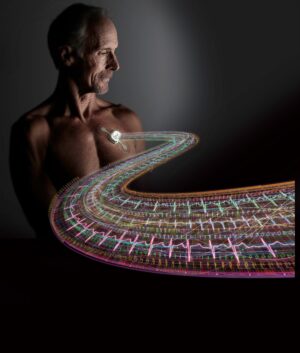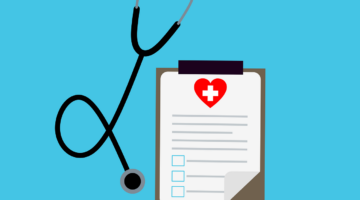
San Francisco-based iRhythm Technologies inked a deal with Alphabet’s life science subsidiary Verily to develop new technologies to help patients with asymptomatic atrial fibrillation (AFib).
Under the agreement, iRhythm will initially pay Verily $5 million with the potential for $12.75 million in milestone payments down the line.
One of several heart rhythm disorders, AFib affects millions of American, making their hearts beat chaotically and increasing their risk for stroke and other complications. Patients are generally treated with blood thinners to prevent clotting. In some cases, ablation procedures are performed to eliminate misfiring heart pacemaker cells. Still, getting any of these treatments is contingent on diagnosing the problem.
“There are an estimated 10 million people in the U.S. at risk for atrial fibrillation, and many of them are not symptomatic,” said iRhythm COO Karim Karti in a phone interview. “When you have AF, you’re at five times the risk of stroke and other cardiac events.”
 To improve detection, iRhythm developed it’s Zio monitor, which adheres to the chest and is designed to collect data for two weeks. After that cycle is complete, the patient mails the monitor back to iRhythm, which processes the data and uploads a report for the treating physician to review.
To improve detection, iRhythm developed it’s Zio monitor, which adheres to the chest and is designed to collect data for two weeks. After that cycle is complete, the patient mails the monitor back to iRhythm, which processes the data and uploads a report for the treating physician to review.
“We’re turning large amounts of data into actionable insights for physicians,” Karti said.
Zio is presented as an alternative to bulkier devices, such as the Holter monitor, that may not collect as much data. However, the company wants to take the technology a step further, developing a device that can be worn for longer periods and detect AFib with better sensitivity.
To get there, the iRhythm/Verily collaboration wants to make the necessary refinements to existing hardware and software to effectively diagnose patients with asymptomatic AFib.
“The key to detection in these asymptomatic patients is to do long-term monitoring, which means monitoring way beyond 30 days,” Karti said. “This relationship that we have signed with Verily is aiming at developing a solution for this market.”
One of the most challenging factors is determining which asymptomatic patients to monitor. Karti noted that, based on previous clinical studies, iRhythm and Verily can stratify by risk factors, such as hypertension, sleep apnea and diabetes. They also plan to work closely with payers to help ensure they reach the right people.
“It’s important to have relationships with payers to do these types of stratification and, most importantly, engage the patient while doing that,” Karti said. “That’s where our relationship with payers, what Verily has developed in terms of a patient engagement platform and also how they’re working with other health plans around the country around other disease states come into play.”
Karti believes iRhythm and Verily bring complementary skills to the collaboration, with both having expertise in wearable technologies and algorithm development. The initial timeline for their first phase is two years.
“This will come with new wearable solutions, new algorithms and new ways of connecting with patients and physicians,” said Karti. “Though it is largely leveraging our platform, it will also develop new parts we don’t have today.”
Photo: and iRhythm Technologies










